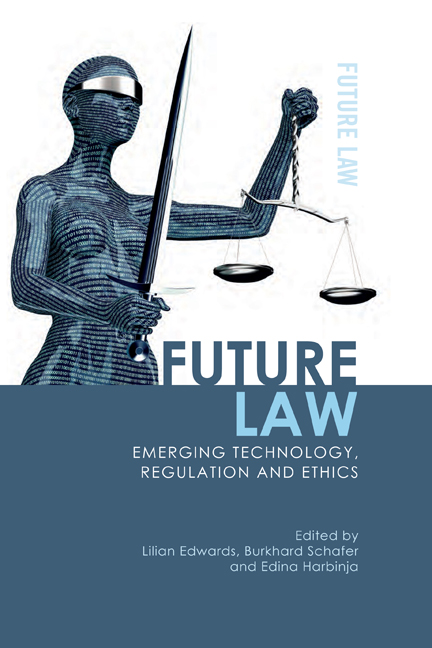Book contents
- Frontmatter
- Contents
- List of Contributors
- List of Figures and Tables
- Table of Cases
- Table of Legislation
- 1 The Future’s Already Here: It’s Just Unevenly Edited
- Part I From Privacy and Princesses, to Security and Star Wars
- 2 Privacy and Identity through the Eyes of Disney Princesses
- 3 White Noise from the White Goods? Privacy by Design for Ambient Domestic Computing
- 4 Citizen-consumers in a Personalised Galaxy: Emotion-influenced Decision Making, a True Path to the Dark Side?
- 5 Big Data Ethics: Darth Vader and the Green Cross Man
- 6 Security Vulnerabilities, Backdoors, Exploits and the Marketplace for Each: The Return of Boba Fett – Bug Bounty Hunter in the New Republic
- Part II A Matter of (Future) Life and Death
- 7 Will My Genes Really Help Me Fit Into Those Jeans? Personal Genomics and Wrap Contracts
- 8 On Living and Undead Wills: ZombAIs, Technology and the Future of Inheritance Law
- 9 ‘Be Right Back’: What Rights Do We Have over Post-mortem Avatars of Ourselves?
- Part III Regulating Autonomous Technologies: Software Are Doing it for Themselves
- 10 Autonomous Intelligent Agents and the Roman Law of Slavery
- 11 Autonomous Vehicles: An Analysis of the Regulatory and Legal Landscape
- Part IV Textual Poaching: Copyright in a Remixed World
- 12 Living in a Remixed World: Comparative Analysis of Transformative Uses in Copyright Law
- 13 Repost This: Instagram and the Art of Re-photography
- Index
1 - The Future’s Already Here: It’s Just Unevenly Edited
Published online by Cambridge University Press: 17 September 2020
- Frontmatter
- Contents
- List of Contributors
- List of Figures and Tables
- Table of Cases
- Table of Legislation
- 1 The Future’s Already Here: It’s Just Unevenly Edited
- Part I From Privacy and Princesses, to Security and Star Wars
- 2 Privacy and Identity through the Eyes of Disney Princesses
- 3 White Noise from the White Goods? Privacy by Design for Ambient Domestic Computing
- 4 Citizen-consumers in a Personalised Galaxy: Emotion-influenced Decision Making, a True Path to the Dark Side?
- 5 Big Data Ethics: Darth Vader and the Green Cross Man
- 6 Security Vulnerabilities, Backdoors, Exploits and the Marketplace for Each: The Return of Boba Fett – Bug Bounty Hunter in the New Republic
- Part II A Matter of (Future) Life and Death
- 7 Will My Genes Really Help Me Fit Into Those Jeans? Personal Genomics and Wrap Contracts
- 8 On Living and Undead Wills: ZombAIs, Technology and the Future of Inheritance Law
- 9 ‘Be Right Back’: What Rights Do We Have over Post-mortem Avatars of Ourselves?
- Part III Regulating Autonomous Technologies: Software Are Doing it for Themselves
- 10 Autonomous Intelligent Agents and the Roman Law of Slavery
- 11 Autonomous Vehicles: An Analysis of the Regulatory and Legal Landscape
- Part IV Textual Poaching: Copyright in a Remixed World
- 12 Living in a Remixed World: Comparative Analysis of Transformative Uses in Copyright Law
- 13 Repost This: Instagram and the Art of Re-photography
- Index
Summary
When, in 2017, the European Parliament adopted the Resolution with Recommendations to the Commission on Civil Law Rules on Robotics, it introduced the topic in an unusual way, for a legal document:
whereas from Mary Shelley's Frankenstein's Monster to the classical myth of Pygmalion, through the story of Prague's Golem to the robot of Karel Čapek, who coined the word, people have fantasised about the possibility of building intelligent machines, more often than not androids with human features.
By evoking in a legal text some of the most recognisable figures from literary fiction, the Parliament confirmed, if confirmation was indeed necessary, the wisdom behind the Gikii conference series, which since 2006 has brought together in an annual event, lawyers, technologists, sociologists, political scientists and other researchers, from industry as well as academe, to explore the intersection between law, popular culture and technology. This book grew out of this ongoing effort not just to bridge the gap between different intellectual traditions and communities, but to explore and leverage the power of human imagination in understanding, critiquing and improving the legal responses to technological change.
Arts and popular culture play a complex role in mediating between law and technology. For scholars, critics and media observers, they can act as an expression of both the enthusiasm and unease that a society feels about technological development, and in this way shape demand for regulatory intervention. They can also provide us with the creative space to think about how societies governed by new laws may look. Asimov's Three Laws of Robotics, first introduced in the short story ‘Runaround’ in 1942, long before autonomous intelligent robots were any kind of real-life possibility, are one key example that has had a palpable impact on the discussion around regulatory theory and jurisprudence. Asimov's laws have been frequently invoked in scholarship, both to explore the limits of legal formalism (i.e. making legal rules into computable code) and as a model for ‘compliance by design’ (think digital rights management or content filters, which operate without any need for enforcement in courts or by police). Since their creation, they have often been mentioned, for example when designing codes of ethics for researchers and have even influenced legislatures, as in South Korea's Robots Charter.
- Type
- Chapter
- Information
- Future LawEmerging Technology, Regulation and Ethics, pp. 1 - 10Publisher: Edinburgh University PressPrint publication year: 2020

